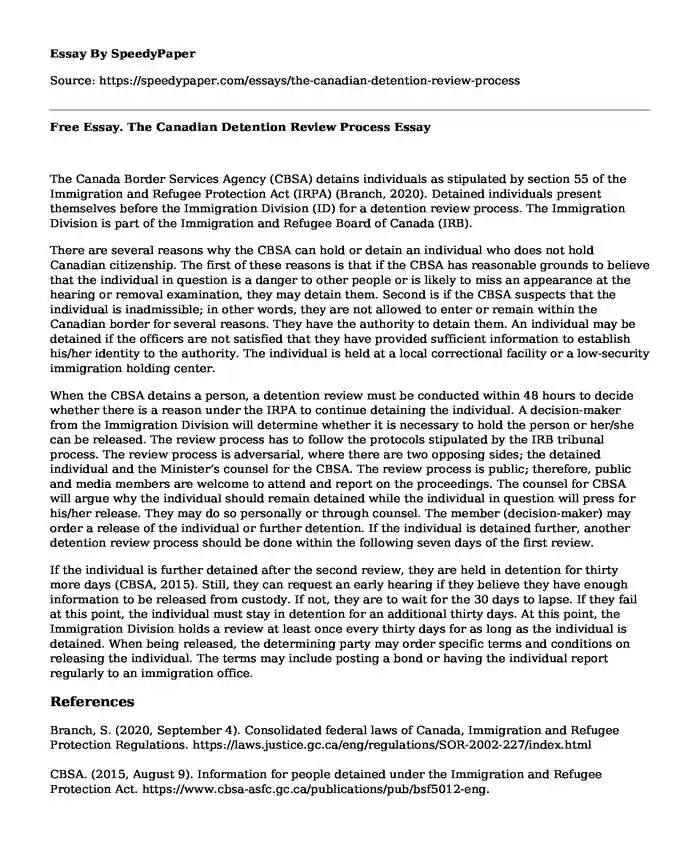
| Type of paper: | Essay |
| Categories: | Immigration Government World Foreign policy |
| Pages: | 2 |
| Wordcount: | 530 words |
The Canada Border Services Agency (CBSA) detains individuals as stipulated by section 55 of the Immigration and Refugee Protection Act (IRPA) (Branch, 2020). Detained individuals present themselves before the Immigration Division (ID) for a detention review process. The Immigration Division is part of the Immigration and Refugee Board of Canada (IRB).
There are several reasons why the CBSA can hold or detain an individual who does not hold Canadian citizenship. The first of these reasons is that if the CBSA has reasonable grounds to believe that the individual in question is a danger to other people or is likely to miss an appearance at the hearing or removal examination, they may detain them. Second is if the CBSA suspects that the individual is inadmissible; in other words, they are not allowed to enter or remain within the Canadian border for several reasons. They have the authority to detain them. An individual may be detained if the officers are not satisfied that they have provided sufficient information to establish his/her identity to the authority. The individual is held at a local correctional facility or a low-security immigration holding center.
When the CBSA detains a person, a detention review must be conducted within 48 hours to decide whether there is a reason under the IRPA to continue detaining the individual. A decision-maker from the Immigration Division will determine whether it is necessary to hold the person or her/she can be released. The review process has to follow the protocols stipulated by the IRB tribunal process. The review process is adversarial, where there are two opposing sides; the detained individual and the Minister’s counsel for the CBSA. The review process is public; therefore, public and media members are welcome to attend and report on the proceedings. The counsel for CBSA will argue why the individual should remain detained while the individual in question will press for his/her release. They may do so personally or through counsel. The member (decision-maker) may order a release of the individual or further detention. If the individual is detained further, another detention review process should be done within the following seven days of the first review.
If the individual is further detained after the second review, they are held in detention for thirty more days (CBSA, 2015). Still, they can request an early hearing if they believe they have enough information to be released from custody. If not, they are to wait for the 30 days to lapse. If they fail at this point, the individual must stay in detention for an additional thirty days. At this point, the Immigration Division holds a review at least once every thirty days for as long as the individual is detained. When being released, the determining party may order specific terms and conditions on releasing the individual. The terms may include posting a bond or having the individual report regularly to an immigration office.
References
Branch, S. (2020, September 4). Consolidated federal laws of Canada, Immigration and Refugee Protection Regulations. https://laws.justice.gc.ca/eng/regulations/SOR-2002-227/index.html
CBSA. (2015, August 9). Information for people detained under the Immigration and Refugee Protection Act. https://www.cbsa-asfc.gc.ca/publications/pub/bsf5012-eng.
Cite this page
Free Essay. The Canadian Detention Review Process. (2023, Dec 13). Retrieved from https://speedypaper.net/essays/the-canadian-detention-review-process
Request Removal
If you are the original author of this essay and no longer wish to have it published on the SpeedyPaper website, please click below to request its removal:
- Essay Sample: UKs GNI and Its Level of Participation in Globalization
- Women and Gender Studies: Definition Essay Sample
- Tanya Maria Golash-Boza: Race and Racisms: A Critical Approach Essay
- Rhetorical Analysis Essay on the Violence in Mass Media Article, Free Example
- Motives of the American Revolution, Free Essay in American History
- Free Essay. the Role of a Free Press in the United States Political System
- World War II Brought About the Cold War. Paper Example
Popular categories




